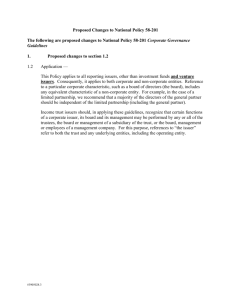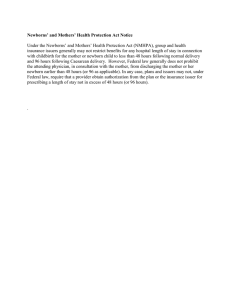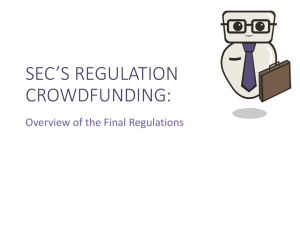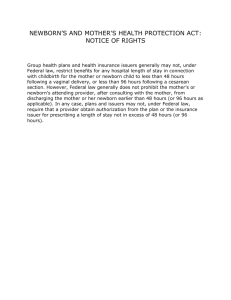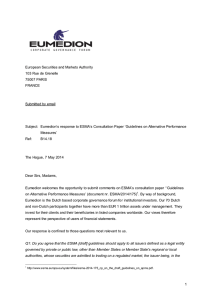EUROPEAN PARLIAMENT ***I DRAFT REPORT 1999
advertisement
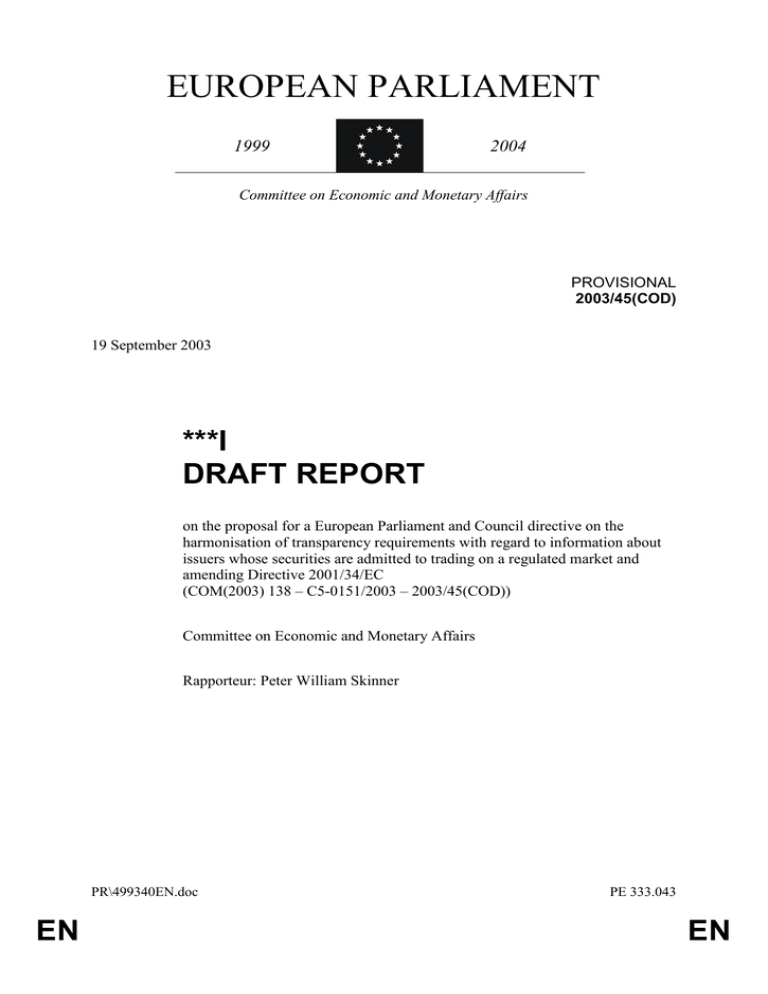
EUROPEAN PARLIAMENT 1999 2004 Committee on Economic and Monetary Affairs PROVISIONAL 2003/45(COD) 19 September 2003 ***I DRAFT REPORT on the proposal for a European Parliament and Council directive on the harmonisation of transparency requirements with regard to information about issuers whose securities are admitted to trading on a regulated market and amending Directive 2001/34/EC (COM(2003) 138 – C5-0151/2003 – 2003/45(COD)) Committee on Economic and Monetary Affairs Rapporteur: Peter William Skinner PR\499340EN.doc EN PE 333.043 EN PR_COD_1am Symbols for procedures * **I **II *** ***I ***II ***III Consultation procedure majority of the votes cast Cooperation procedure (first reading) majority of the votes cast Cooperation procedure (second reading) majority of the votes cast, to approve the common position majority of Parliament’s component Members, to reject or amend the common position Assent procedure majority of Parliament’s component Members except in cases covered by Articles 105, 107, 161 and 300 of the EC Treaty and Article 7 of the EU Treaty Codecision procedure (first reading) majority of the votes cast Codecision procedure (second reading) majority of the votes cast, to approve the common position majority of Parliament’s component Members, to reject or amend the common position Codecision procedure (third reading) majority of the votes cast, to approve the joint text (The type of procedure depends on the legal basis proposed by the Commission) Amendments to a legislative text In amendments by Parliament, amended text is highlighted in bold italics. Highlighting in normal italics is an indication for the relevant departments showing parts of the legislative text for which a correction is proposed, to assist preparation of the final text (for instance, obvious errors or omissions in a given language version). These suggested corrections are subject to the agreement of the departments concerned. PE 333.043 EN 2/23 PR\499340EN.doc CONTENTS Page PROCEDURAL PAGE .............................................................................................................. 4 DRAFT EUROPEAN PARLIAMENT LEGISLATIVE RESOLUTION ................................. 5 EXPLANATORY STATEMENT............................................................................................ 20 OPINION OF THE COMMITTEE ON LEGAL AFFAIRS AND THE INTERNAL MARKET ................................................................................................................ ...................................................................................................................................................... PR\499340EN.doc 3/23 PE 333.043 EN PROCEDURAL PAGE By letter of 26 March 2003 the Commission submitted to Parliament, pursuant to Articles 251(2) and in particular articles 44 and 95 thereof of the EC Treaty, the proposal for a European Parliament and Council directive on the harmonisation of transparency requirements with regard to information about issuers whose securities are admitted to trading on a regulated market and amending Directive 2001/34/EC (COM(2003) 138 – 2003/45(COD)). At the sitting of 15 May 2003 the President of Parliament announced that he had referred the proposal to the Committee on Economic and Monetary Affairs as the committee responsible and the Committee on Legal Affairs and the Internal Market for its opinion (C5-0151/2003). The Committee on Economic and Monetary Affairs appointed Peter William Skinner rapporteur at its meeting of 21 May 2003. The committee considered the Commission proposal and draft report at its meetings of .... and ..... At the last meeting it adopted the draft legislative resolution by ... votes to ..., with ... abstention.... The following were present for the vote .... (chairwoman), .... (vice-chairman), ... (vicechairman), Peter William Skinner (rapporteur), ..., ... (for ...), ..... (for .... pursuant to Rule 153(2)), .... and ..... The opinion of the Committee on Legal Affairs and the Internal Market is attached. The report was tabled on .... PE 333.043 EN 4/23 PR\499340EN.doc DRAFT EUROPEAN PARLIAMENT LEGISLATIVE RESOLUTION on the proposal for a European Parliament and Council directive on the harmonisation of transparency requirements with regard to information about issuers whose securities are admitted to trading on a regulated market and amending Directive 2001/34/EC (COM(2003) 138 – C5-0151/2003 – 2003/45(COD)) (Codecision procedure: first reading) The European Parliament, – having regard to the Commission proposal to the European Parliament and the Council (COM(2003) 138)1, – having regard to Articles 251(2) and in particular articles 44 and 95 thereof of the EC Treaty, pursuant to which the Commission submitted the proposal to Parliament (C5-0151/2003), – having regard to Rule 67 of its Rules of Procedure, – having regard to the report of the Committee on Economic and Monetary Affairs## (##), 1. Approves the Commission proposal as amended; 2. Calls on the Commission to refer the matter to Parliament again if it intends to amend the proposal substantially or replace it with another text; 3. Instructs its President to forward its position to the Council and Commission. Text proposed by the Commission Amendments by Parliament Amendment 1 Recital 6 A high level of investor protection throughout the Community would enable the removal of barriers to the admission of securities to regulated markets situated or operating in the territory of a Member State. Member States other than the home Member State should no longer be allowed to restrict admission of securities to their regulated markets by imposing more stringent requirements on periodic and ongoing information about issuers whose securities are admitted to trading on a 1 A high level of investor protection throughout the Community would enable the removal of barriers to the admission of securities to regulated markets situated or operating in the territory of a Member State. Member States other than the home Member State should no longer be allowed to restrict admission of securities to their regulated markets by imposing more stringent obligations on periodic and ongoing information about issuers whose securities are admitted to trading on a Not yet published in OJ.. PR\499340EN.doc 5/23 PE 333.043 EN regulated market. regulated market, unless an issuer wishes to opt in to more stringent obligations. Justification See justification to amendment to article 3, paragraph 1. Amendment 2 Recital 8a (new) The annual financial report should contain information regarding the remuneration scales of employees and senior management, in order to have full accountability for investors of salary packages paid by issuers. Justification See justification to amendment to article 4, paragraph 2, point ca (new). Amendment 3 Recital 8b (new) Member States should encourage issuers to disclose payments made to governments and the Commission should support this voluntary approach with concrete proposals. Justification See amendment to article 4, paragraph 2a (new). Amendment 4 Recital 9 More timely and more reliable information about the issuer’s performance over the year also requires a PE 333.043 EN Deleted 6/23 PR\499340EN.doc higher frequency of interim financial information. There has been a marked trend at international level and in the majority of the Member States to move to a quarterly frequency, but the reporting standards for such quarterly information differ. A first important step should be made to make quarterly financial information mandatory for the first and third quarter of a financial year. Such quarterly financial information would not imply the establishment of interim reports following the International Accounting Standards, in particular IAS 34. Instead, quarterly financial information should provide key historical data on the issuer’s performance. If the issuer so chooses, it would also include a trend information allowing investors to judge on any longterm strategy, which the share issuer pursues. Justification See justification to amendment to article 6. Amendment 5 Recital 11 The public should be informed of changes to major holdings in issuers whose shares are traded on a regulated market situated or operating within the Community; those issuers can inform the public of changes in major holdings only if they have been informed of such changes by the holders. This information should enable investors to acquire or dispose of shares in full knowledge of changes in the voting and capital structure leading to blocking minorities; it should also enhance effective control of share issuers and overall market transparency on important capital movement. In order to simplify the periods for notifying changes to the voting rights or to the capital structure and to approximate PR\499340EN.doc The public should be informed of changes to major holdings in issuers whose shares are traded on a regulated market situated or operating within the Community; those issuers can inform the public of changes in major holdings only if they have been informed of such changes by the holders. This information should enable investors to acquire or dispose of shares in full knowledge of changes in the voting and capital structure leading to blocking minorities; it should also enhance effective control of share issuers and overall market transparency on important capital movement. Custodians should not be required to inform issuers of changes in holdings which they hold in their capacity 7/23 PE 333.043 EN them more amongst Member States, such periods should be limited to five business days for the holder and subsequently to three business days for the issuer to disclose such information to the public. as custodians, provided that they do not have any discretion over, or any influence on, how the voting rights attached to those shares are exercised. In order to simplify the periods for notifying changes to the voting rights or to the capital structure and to approximate them more amongst Member States, such periods should be limited to five business days for the holder and subsequently to three business days for the issuer to disclose such information to the public. Justification Custodian banks which hold securities in their own name but on behalf of clients and which do not exercise ownership rights over the securities should not fall into the scope of provisions regarding notification to the issuer of acquisition/disposal of major shareholdings. Furthermore, the markets could be misled by information concerning holdings by custodian banks and shareholdings could be double counted. Amendment 6 Recital 15 To ensure timely access to information about the issuer whose securities are admitted to trading on regulated markets in more than one Member State, the Internet sites of the issuer concerned might also be used as means of public disclosure, provided that real-time dissemination of information is ensured, together with an efficient electronic alert system for all interested parties. To ensure timely access to information about the issuer whose securities are admitted to trading on regulated markets in more than one Member State, real-time dissemination must be ensured. Justification See justification to amendment to article 17. Amendment 7 Recital 26a (new) In exercising its implementing powers in accordance with this Directive, the PE 333.043 EN 8/23 PR\499340EN.doc Commission should respect the following principles: – the need to ensure confidence in financial markets among investors by promoting high standards of transparency in financial markets; – the need to provide investors with a wide range of competing investments and a level of disclosure and protection tailored to their circumstances; – the need to ensure that independent regulatory authorities enforce the rules consistently, especially as regards the fight against economic crime; – the need for high levels of transparency and consultation with all market participants and with the European Parliament and the Council; – the need to encourage innovation in financial markets if they are to be dynamic and efficient; – the need to ensure market integrity by close and reactive monitoring of financial innovation; – the importance of reducing the cost of, and increasing access to, capital; – the balance of costs and benefits to market participants on a long-term basis (including small and medium-sized businesses and small investors) in any implementing measures; – the need to foster the international competitiveness of EU financial markets without prejudice to a much-needed extension of international cooperation; – the need to achieve a level playing field for all market participants by establishing EU-wide regulations every time it is appropriate; – the need to respect differences in national markets where these do not unduly impinge on the coherence of the single market; PR\499340EN.doc 9/23 PE 333.043 EN – the need to ensure coherence with other EU legislation in this area, as imbalances in information and a lack of transparency may jeopardise the operation of the markets and above all harm consumers and small investors. Justification The Commission should be guided by these principles when exercising its implementing powers Amendment 8 Article 3, paragraph 1 The home Member State may make an issuer subject to requirements more stringent than those laid down in this Directive, as regards the disclosure of information to the public or to security holders. The home Member State may make an issuer subject to obligations more stringent than those laid down in this Directive. Where an issuer of securities admitted to trading on a regulated market in the EU wishes to accept obligations more stringent than those laid down by this Directive, and requests a host competent authority to regulate its compliance with such obligations, the host competent authority may impose obligations on the issuer more stringent than those provided for in this Directive, but no more stringent than those applied to issuers of securities of the same class for which it is the home competent authority. The home Member State may also make a security holder subject to requirements more stringent than those laid down in this Directive, as regards the notification of information. The home Member State may also make a security holder subject to requirements more stringent than those laid down in this Directive, as regards the notification of information. Justification (i) The term "obligations" should be used since it is the one employed in the current legislation and it encompasses a wider range of rules than "requirements'. (ii) Host Member States should be able to allow non-domestic issuers to opt in to additional obligations if they so wish, for example, in order to obtain a quality seal from a particular market. PE 333.043 EN 10/23 PR\499340EN.doc Amendment 9 Article 3, paragraph 2, introductory phrase A host Member State may not: Except as provided for in paragraph 1, a host Member State may not: Justification See justification (ii) to amendment to article 3, paragraph 1. Amendment 10 Article 4, paragraph 2, point (ca) (new) The annual financial report should contain information regarding the remuneration scales of the issuer, including the total compensation packages of the senior management and key personnel. Justification The management of private companies must be fully accountable, transparent and open regarding the remuneration structure of their company. Salary scales (already provided in the public sector) should therefore be included in the annual financial report so that investors have a full appreciation of the remuneration policies of companies they are investing in. For senior management of the company, the total value of remuneration should be specified, for example, including pension plans and share options. Amendment 11 Article 4, paragraph 2a (new) Member States shall encourage issuers to disclose in the annual financial report any payments made to governments. The Commission shall submit proposals for supporting this voluntary approach. PR\499340EN.doc 11/23 PE 333.043 EN Justification The transparency of information principle should also apply to payments made by companies to governments, in particular by the extractive industries. Member States should encourage companies to disclose any payments to governments on a voluntary basis. This disclosure should be made on a voluntary basis and the Commission should bring forward proposals to support the voluntary approach. Amendment 12 Article 5, paragraph 5, point (c) (c) if there is evidence of an urgent need to enhance investor protection throughout the Community, make the half-yearly financial report subject to a mandatory auditors’ review. Deleted Justification The decision as to whether it is necessary to introduce mandatory auditing of the half-yearly report should not be taken via implementing measures. Amendment 13 Article 6 1. An issuer whose shares are admitted to trading on a regulated market shall disclose to the public quarterly financial information covering the first and third quarter, respectively, of the financial year, as soon as possible after the end of the relevant three-month period, but at the latest two months thereafter. The same issuer shall ensure that the quarterly financial information remains available to the public. Deleted 2. Quarterly financial information shall contain at least: (a) consolidated figures, presented in table form, indicating, for the relevant three-month period, the net turnover, and the profit or loss before or after deduction PE 333.043 EN 12/23 PR\499340EN.doc of tax; and (b) an explanatory statement relating to the issuer’s activities and profits and losses during the relevant three-month period; and (c) if the issuer so chooses an indication of the likely future development of the issuer and its subsidiaries at least for the remaining financial year, including any significant uncertainties and risks which may affect that development. 3. Where the quarterly financial information, or any quarterly financial report, has been audited, the audit report, and any qualifications thereto or references to any matters by way of emphasis to which the auditors draw attention without qualifying their report, shall be reproduced in full. The same shall apply in the case of an auditors’ review. If the quarterly financial information has not been audited or reviewed by auditors, the issuer shall make a statement to that effect. 4. The Commission shall, in accordance with the procedure referred to in Article 23(2), adopt implementing measures, in order to take account of technical developments on financial markets and to ensure the uniform application of paragraphs 1, 2 and 3 of this Article. The Commission shall, in particular: (a) specify the period of time throughout which published quarterly financial information is to remain available to the public, as well as any other conditions to be complied with by the issuer in that connection (b) clarify, if necessary, the terms “net turnover” and “profit or loss before or after deduction of tax” in relation to specific types of issuers, such as credit institutions; PR\499340EN.doc 13/23 PE 333.043 EN (c) specify the information to be given in the explanatory statement, as referred to in paragraph 2(b), and in the indication of the issuer’s likely future development, as referred to in paragraph 2(c); (d) clarify the nature of the auditors’ review, referred to in paragraph 3. Justification Quarterly reporting is an inappropriate method of boosting information levels available to investors - continuous disclosure would suffer, while issuers could save up bad news until the next quarterly reports - and would represent a false promise to investors of being an improvement in information levels. Quarterly disclosure is an extremely costly mechanism and it encourages management to focus on short-term earnings performance, at the expense of long-term strategy. The availability punctually of relevant information is what is of value to investors. Amendment 14 Article 17 1. The home Member State shall ensure that the issuer discloses regulated information in a manner ensuring timely access to such information. In particular, it shall require the issuer to use such media as may reasonably be relied upon for the effective dissemination of information to the public throughout its territory and abroad. The home Member State may not impose an obligation to use only media whose operators are established on its territory. Nor may it prevent the issuer from using a single medium for disseminating all regulated information. 1. Each Member State shall ensure that issuers whose securities are admitted to trading on regulated markets in its jurisdiction disclose regulated information in a manner ensuring timely access to such information. In particular, each such Member State shall require such issuers to use such media as may reasonably be relied upon for the effective dissemination of information to the public throughout the European Union. Member States may not impose an obligation to use only media whose operators are established on their respective territories. Nor may a Member State prevent issuers from using a single medium for disseminating all regulated information. 2. A host Member State may not impose on issuers any requirements regarding the media to be used for the dissemination of regulated information. However, a host Member State may Deleted PE 333.043 EN 14/23 PR\499340EN.doc require issuers: (a) to publish regulated information on their Internet sites, in which case the host Member State shall keep the public informed as regards the Internet sites of issuers; and (b) to alert any interested person, without delay and free of charge, to any new disclosure or any change to regulated information which has already been published, such communication to be effected by electronic means or, upon request, on paper. 3. Where securities are admitted to trading on a regulated market in only one host Member State, and not in the home Member State, the host Member State shall ensure disclosure of regulated information in accordance with the requirements referred to in paragraph 1. Deleted 4. In order to take account of technical developments on financial markets, to take account of developments in information and communication technology and to ensure the uniform application of paragraphs 1, 2 and 3 of this Article, the Commission shall adopt implementing measures in accordance with the procedure referred to in Article 23(2). In order to take account of technical developments on financial markets, to take account of developments in information and communication technology and to ensure the uniform application of paragraph 1 of this Article, the Commission shall adopt implementing measures in accordance with the procedure referred to in Article 23 (2). The Commission shall, in particular, specify: The Commission shall, in particular, specify for the various types of regulated information, conditions and time-limits in accordance with which published regulated information must be kept available to the public. (a) minimum standards for the dissemination of regulated information via the issuers’ Internet sites, including the conditions for alerting interested parties; (b) for the various types of regulated information, conditions and time-limits in accordance with which published regulated information must be kept available to the public. PR\499340EN.doc 15/23 PE 333.043 EN The Commission may also specify and update a list of media for the dissemination of information to the public. Justification Investors have the right to expect rapid and cross-border dissemination of the information which issuers are obliged to supply. It is not sufficient to rely on internet sites and email alert systems - instead Member States have a duty to ensure that information is disseminated simultaneously and ensure cross-border coverage. Amendment 15 Article 19, paragraph 1, subparagraph 1 1. Where the registered office of an issuer is in a third country, the competent authority of the home Member State may exempt that issuer from requirements under Articles 4 to 7 and Articles 11 to 14, provided that the law of the third country in question lays down at least equivalent requirements. 1. Where the registered office of an issuer is in a third country, the competent authority of the home Member State may exempt that issuer from requirements under Articles 4 to 7 and Articles 12 to 14, provided that the law of the third country in question lays down requirements that are at least comparable with those under Articles 4 to 7 and Articles 12 to 14 of this Directive. Justification The term "comparable" should be used instead of "equivalent", with regards to the requirements on issuers in third countries. This will avoid misinterpretation and will ensure coherence with other directives (e.g. the Insurance Groups Directive 98/78/EC). Amendment 16 Article 19, paragraph 3 3. In order to ensure the uniform application of paragraphs 1 and 2, the Commission may, in accordance with the procedure referred to in Article 23(2), adopt implementing measures stating that, by reason of its domestic law, regulations, administrative provisions, or of the PE 333.043 EN 3. In order to ensure the uniform application paragraphs 1 and 2, the Commission may, in accordance with the procedure referred to in Article 23 (2), adopt implementing measures stating that, by reason of its domestic law, regulations, administrative provisions, or of the 16/23 PR\499340EN.doc practices or procedures based on international standards set out by international organisations, a third country ensures the equivalence of the information requirements provided for in this Directive. practices or procedures based on international standards set out by international organisations, a third country ensures the comparability of the information requirements provided for in this Directive. Justification See justification for amendment to Article 19, paragraph 1. Amendment 17 Article 26, paragraph 1 1. Notwithstanding Article 5(3) of this Directive, the home Member State may exempt from disclosing financial statements in accordance with Regulation (EC) No.1606/2002: 1. Articles 4 and 5 of this Directive shall apply to all issuers for the financial years starting on or after 1 January 2007. (a) all issuers for the financial year starting on or after 1 January 2005; (b) issuers referred to in Article 9 of Regulation (EC) No.1606/2002 for the financial years starting on or after 1 January 2005 and 1 January 2006. Justification Issuers and their investors would have difficulty coping with the simultaneous implementation of IAS standards and the transparency directive. Given that the implementation of IAS is already provided for in legislation, the deadline for implementation of provisions in the transparency directive relating to the provision of the annual and half-yearly report should be postponed until 1 January 2007. Amendment 18 Article 26, paragraph 3 3. The home Member State may exempt debt security issuers from disclosing half-yearly financial reports in accordance with Article 5 for three years following the entry into force of this PR\499340EN.doc 3. This Directive shall not apply to issuers that have only non-equity securities admitted to a regulated market in the EU, provided that those securities were issued prior to entry into force of Directive 17/23 PE 333.043 EN [2003/…/EC] [Prospectus]. Directive, provided that: (a) the last application for admission of the issuer’s debt securities to trading on a regulated market in any Member State was made before the entry into force of Directive […/…/EC] [Prospectus], and (b) the home Member State decided to allow issuers to benefit from the provisions of Article 27 of Directive 2001/34/EC. After the end of the three-year period, exemptions may be granted only in accordance with Article 8. Justification This reflects more accurately the duration of debt securities. The proposed transition period for issuers of debt securities of three years is arbitrary and too short. Many such securities remain in issue for significantly longer periods. A short transition period for such securities would be disruptive to the market, as many issuers would choose to de-list their debt securities and institutional investors would respond by selling the securities in order to comply with the institutions’ investment policies, thereby putting strong downward pressure on the prices for debt securities in regulated markets in the EU. Amendment 19 Article 29 The Commission shall by 30 June 2007 at the latest report on the operation of this Directive to the European Parliament and to the Council. PE 333.043 EN The Commission shall by 30 June 2007 at the latest report on the operation of this Directive to the European Parliament and to the Council, including a review of whether there is a need to enhance investor protection throughout the Community by making the half-yearly financial report subject to a mandatory auditors' review. On the basis of that report, the Commission may submit proposals for related amendments to this Directive. 18/23 PR\499340EN.doc Justification See justification for amendment to article 5, paragraph 5, point (c). PR\499340EN.doc 19/23 PE 333.043 EN EXPLANATORY STATEMENT Introduction Your Rapporteur wholeheartedly approves of the European Commission's objective of proposing an overhaul of the rules regarding the information which is made available to investors about publicly traded companies on Europe's regulated securities markets. EU transparency requirements for issuers are in need of updating in order to improve investor protection, reassure investors, reduce the cost of capital, and thereby encourage investment in Europe's financial markets. Your Rapporteur would like to express broad approval of the European Commission's proposal as a method of improving disclosure requirements throughout Europe. However, although the Rapporteur fully agrees with the aims of the proposal, the Commission has not always employed the most appropriate method of attaining those objectives, and your Rapporteur has the following points to make:1. Quarterly reporting Your Rapporteur is unconvinced by the case for introducing mandatory quarterly reporting (Article 6). Well-functioning financial markets require the dissemination of reliable company information in a timely fashion, but quarterly reporting is simply not the appropriate mechanism for ensuring this. The Rapporteur proposes a qualitative approach, rather than one which relies merely on frequency of information provision. It is not, in fact, the frequency of information punctually which is valued by investors, large or small, but the provision of relevant, quality information, as soon as it becomes available investors deserve to be provided with quality information at the right time. Mandatory quarterly reports would encourage companies to store up valuable, market-sensitive information until the next quarterly report, rather than releasing it immediately. This would not represent an improvement for investors and indeed could represent a worsening of the situation, since companies could save up bad news until the next quarterly report, instead of making an immediate announcement and investors would have to wait for information, whether good or bad. Issuers would be tempted to rely less on continuous disclosure, therefore inhibiting the current well-functioning system of continuous disclosure via market announcements and trading updates, and the markets would be beret of a steady stream of information. In addition to failing to deliver upon its promises of improving information provision, quarterly reporting is also a costly mechanism1 and one which will be relatively considerably more costly for smaller companies. SMEs simply do not have the resources to cope with quarterly reporting provisions. Company management is also likely to take responsability for allowing information into the market without auditing it, so the quarterly reporting could 1 Barclays has estimated that the additional annual cost of producing quarterly reports would be, at a conservative estimate, EUR 1.3 million, which would include: cost of Staging Announcement and printing packs; additional staff costs; additional audit and legal fees. This figure does not include indirect costs. PE 333.043 EN 20/23 PR\499340EN.doc become de facto audited. The extra costs incurred by quarterly reporting would inevitably be passed on to the end client, increasing the cost of raising capital, which would be counter to the Risk Capital Action Plan. Quarterly reporting would also create a focus on short-term earnings performance rather than on a company's longer-term strategy. It would encourage companies to manage their earnings in line with their forecast of investors' expectations. In fact, the demands placed on management to release better and better figures each quarter contributed to a large degree to the many corporate scandals of recent years. Your Rapporteur does not propose abolishing all rules on quarterly reporting. Rather, Member States should be able to choose whether to apply quarterly reporting provisions on issuers based in that Member State. Article 3 as it stands in the Commission's proposal would already permit Member States to do this. Quarterly reporting may be an appropriate reporting mechanism for some markets - but certainly not for all. 2. Right of an issuer to secure a supplementary quality seal The Commission's proposal permits Member States (Article 3) to place additional obligations only on issuers which are registered in that home Member State. A host Member State may not therefore impose additional obligations on "incoming" issuers. However, this approach does not take account of a situation whereby an incoming issuer may wish to opt-in to additional obligations imposed on some home issuers. They may, for example, wish to do this in order to acquire a seal of approval of a particular niche level of market. To deny issuers the option of being subject on certain regulated markets to superequivalent, consensual standards, (i.e. rules that go beyond the main body of rules), would deny them an opportunity to choose to carry a particular brand mark of a particular market. This in turn, would be a corruption of the single passport approach. Therefore your Rapporteur proposes that issuers should be provided with the choice of opting into additional responsibilities over and above the core harmonisation requirements, as is the case currently in several Member States. 3. Wide and rapid dissemination of information It is essential for investors to be able to access information about issuers in an efficient and fair way, that does not discriminate against any particular type of communication method, but which is appropriate for modern communication channels. The Commission's proposal forbids (Article 17) host Member States from imposing any requirements on non-domestic issuers concerning the media to be employed regarding the dissemination of information, apart from merely requiring publication on internet sites and sending out alert messages. This would mean that issuers in the home country would be subject to one set of rules and issuers in a host country could be subject to a different set of rules, which would mean uneven distribution of information for the same market. Furthermore, the Commission relies on a very basic common standard for information distribution of publication of information via internet sites and email alerts. This is impractical - investors are unlikely to be able or willing to search out the relevant information on the myriad of relevant available websites and are unlikely to favour being potentially deluged with scores of updating message alerts. Also, there is a danger that issuers could PR\499340EN.doc 21/23 PE 333.043 EN place less favourable news in an inaccessible part of their website. There is also a need to improve distribution mechanisms by allowing for a "push" system of real-time information delivery, as well as a "pull" system of information availability. For example, existing news dissemination sources can be an important source of real-time information for investors which is truly cross-border and simultaneous, and services are available to professionals as well as to retail customers (via free access services). The printed media can be equally important - albeit more as a source of less time-sensitive information. 4. Requirement for third countries Article 19 aims to provide that requirements placed by third countries on issuers from these countries are recognised. However, the proposal's drafting needs to be tightened up so that the concept of "comparable" rather than "equivalent" requirements is used, since the latter term could lead to misinterpretation and there should be coherence with other directives (for example "comparable" is the terminology used in the Insurance Groups Directive (98/78/EC). 5. Implementation clash with IAS The Commission's proposed date of 1 January 2005 is not generous enough, given that IAS will also have to be implemented by all companies on this date. Compliance with both new sets of rules would be extremely burdensome, and the implementation date for the key Articles 4 and 5 of the transparency directive should therefore be delayed until 1 January 2007, in order to mitigate against unforced errors during the key implementation of the regulations. The implementation of IAS will be a challenge for issuers as well as investors who need to understand the difference in presentation of accounts, therefore in the interests of all participants in the financial markets, the implementation date for this transparency directive should be amended. 6. Custodian banks Custodian banks which hold securities in their own name but on behalf of clients and which do not exercise ownership rights over the securities should not fall into the scope of the directive, and should not be subject to the provisions (Articles 9 and 10) regarding notification to the issuer of acquisition/disposal of major shareholdings. Furthermore, the markets could be misled by information concerning holdings by custodian banks and shareholdings could be double counted. The Commission's draft is unclear on this issue, and the exemption for custodian banks should therefore be spelt out in recital 11. 7. Enabling clause regarding transparency of extractive industries Transparency is a principle, which should be applied also with regards to payments made by companies to governments, in particular by the extractive industries. It is essential to improve government accountability, for example to encourage the use of natural resources for the economic and social good, rather than them being the cause of misery and deprivation. Member States should encourage companies to voluntarily disclose payments made to developing countries' governments where they operate. This disclosure should be made on a voluntary basis, and the Commission should support this with concrete measures. PE 333.043 EN 22/23 PR\499340EN.doc 8. Transparency of remuneration scales Your Rapporteur considers that a fundamental aspect of transparency involves company management being fully accountable for the remuneration structure of the company. There should therefore be an addition to Article 4 to provide that the annual financial reports should include the remuneration structure of the company employees and directors so that investors have a full appreciation of the remuneration policies of companies they are investing in. For senior management of the company, the total value of remuneration should be specified, for example, including pension plans. 9. Implementing measures The use of comitology powers in relation to matters concerning whether there is need to further enhance investor protection is not appropriate. i.e. the decision as to whether the halfyearly annual report should if necessary be subject to mandatory auditors' review should be taken following a thorough review by the European Commission not via implementing measures. PR\499340EN.doc 23/23 PE 333.043 EN
